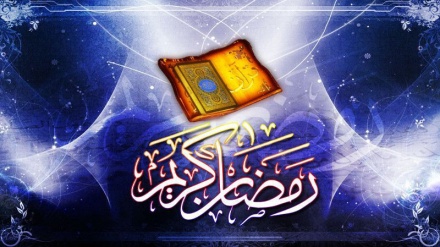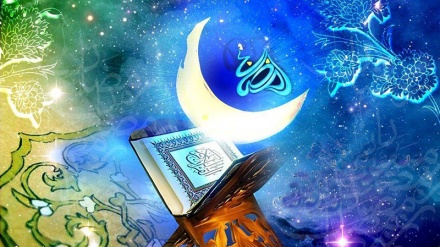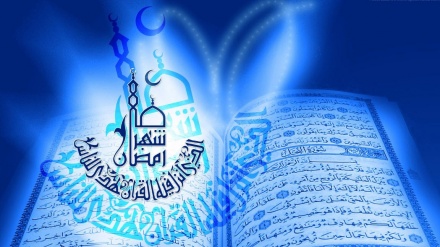Blessed Month of Ramadan
Welcome to the 22nd episode of the series “Blessed Month of Ramadhan”. A statement from Prophet Mohammad (Blessings of God upon him and his progeny) says: The entire sins of the servants of God are forgiven if they remain awake on the Night of Qadr performing prayers and acts of worship, based on honesty, purity, and faith in God.
Let’s hail a night, which according to God, is superior to a thousand nights. Let’s greet an infinite night which is filled with divine mercy and forgiveness; a night in which the whole Holy Qur’an was descended upon the heart of the Prophet of Islam.
The Night of Qadr is highly likely on the 23rd eve of the blessed month of Ramadhan. The Prophet’s 6th Infallible Successor, Imam Ja’far Sadeq (AS) notes: The Night of Qadr is the heart of the blessed month of Ramadhan.
In view of the Imam’s saying, if someone wants to truly understand the blessed month of Ramadhan, he/she should appropriately realize the worth of the heart of this auspicious month; which is the Night of Qadr. Acts of worship and recitation of the Holy Qur’an on the Night of Qadr purify one’s soul. The Night of Qadr raises an opportunity for contemplation and adoption of important decisions, because this night is the night of determination of fate for the rest of the year by God Almighty. Undoubtedly, everyone seeks the best fate. However contemplation is needed in order to find out what the best fate can be. On the Night of Qadr, which is the night of the descent of the Holy Qur’an upon the Prophet’s heart, over a millennium and four-and-a-half centuries ago, angels, by the command of the God Almighty continue to descend upon Earth, cast a glance at the gatherings of the faithful, greet them and visit the Lord of the Age, the Prophet’s Last and 12th Infallible Successor, Imam Mahdi (may God hasten his reappearance for end of tyranny and corruption through establishment of the global government of peace, prosperity and justice on Planet Earth. The atmosphere of the Night of Qadr is peace and spiritual tranquility until the break of dawn.
O Almighty God, we beseech You on the Night of Qadr, for the sake of the Prophet and his blessed Ahl al-Bayt, to shower Your mercy upon us, forgive us, and decree the best fate for us.
One of the well-known supplications recited by the faithful on the Night of Qadr is Jowshan al-Kabeer, and is the key to solving of many problems. Jowshan in Arabic means armour, or more properly which means the strong cuirass or breastplate. It has been mentioned in the books, “Balad al-Amin” and the “Misbah” of Shaikh Kafa’mi on the authority of Imam Zain al-Abedin (AS) who relates from his father, Imam Husain (AS) the Martyr of Karbala, and from his grandfather the Commander of the Faithful, Imam Ali ibn Abi Taleb (AS), that this supplication was sent by God Almighty to Prophet Mohammad (blessings of God upon him and his progeny). It happened that during one of the battles that the Arab infidels had imposed on Muslims, the Prophet was wearing very heavy armour that was hurting his body. Suddenly the Archangel Gabriel descended and said: Your Lord conveys his salutations to you and has said to take this Du’a al-Jowshan whose recitation is a protection for you and your Ummah.
For the information of our listeners, this supplication consists of one hundred stanzas mentioning and glorifying the divine names and attributes, after which the phrase Subhanaka ya la-ilaha illa Unt, al-Ghows al-Ghows, khallisna min-an-naar ya Rabb. It means: glory to You besides Whom there is no god; mercy mercy O Lord, deliver us from the (Hell)Fire.
Here we present you the English translations of some passages of this unique and matchless supplication Jowshan al-Kabeer:
“О My God; I beseech You through Your Names; O God; Most Merciful; All-Compassionate; Ąll-Knowing; Clement; One of Might; All-Wise; Pre-eternally Existent; Ever Enduring; Most Generous— Glory unto You; You have no partner or fault! There is no god but You! Mercy, mercy; deliver us from Hell-fire!
“О Lord of lords! O Answerer of prayer; О Preserver of good deeds; О Most Lofty in degree; O Bestower of blessings; O Forgiver of sins; O Repulsor of afflictions; O Hearer of sounds; O Granter of requests; O Knower of things secret and hidden— Glory unto You’ You have no partner or fault! There is no god but You! Mercy, mercy, deliver us from Hell-fire!
“О One of Might and Beauty; О Possessor of Dominion and Glory; О Owner of Power and Perfection; О He who is Sublime, Most High; О He Whose designs arc most powerful; О He Whose chastisement is most severe; О He Who calls to account most swiftly; О He with Whom is the best of rewards; О He with Whom is ‘the Mother of the Book’; О He Who piles up the laden clouds— Glory unto You; You have no partner or fault! There is no god but You! Mercy, mercy, deliver us from Hell-fire!
In the 11th ayah of Surahj Ya Seen states:
“You can only warn someone who follows the Reminder (i.e. the holy Qur’an) and fears the All-Beneficent (Lord) in secret; so give him the good news of forgiveness and a noble reward.”
This ayah refers to the potential of individuals for being guided. Those who neglect their inner voice; do not make use of their wisdom; and are indifferent toward others’ reasoning, certainly deprive themselves of diving guidance. However, the doors of guidance are open to those, who listen to remarks and contemplate.
God tells the Prophet of Islam that you can only influence those who listen to divine ayahs with attention. The pagan Arabs in order to obstruct others from hearing the words of guidance of the Prophet of Islam, used to heckle when the Prophet recited the ayahs of the Holy Qur’an. Thus, in this ayah, God notes that those who listen to the Holy Qur’an, pay attention to it, comply with it, and are Godwary in secret, are the ones who can be guided. This ayah refers to those who are Godwary in secret, unlike the hypocrites who are Godwary in the presence of people, but are not Godwary in secret.
Meanwhile, whenever one stands before a prominent figure, one feels the latter’s grandeur and may sense fear. In contrast, the faithful’s fear of God is coupled with hope. Although he doesn’t consider himself safe from the divine punishment, he has set his hopes on divine mercy and forgiveness.
Thus, for those who are truly Godwary, they are granted two blessings. Firstly, God forgives their sins and secondly they are given a huge reward. At this point, God, similar to a gardener who initially takes out weeds and sows seeds in order to grow plants and flowers, first wipes away sins with His forgiveness so that the pious person deserves the divine reward which is nothing but the bliss of paradise.
You must have heard that a healthy spirit is in a healthy body, and that mental and spiritual health is tied to physical health. The Prophet’s 8th Infallible Heir, Imam Reza (AS) has said: One’s soul is impacted by one’s physical state.
Today, it has been proven that some foods influence one’s behaviour. For instance, grapes turn sadness into happiness and reinforce one’s nerves. Haleem which is a kind of porridge enhances the freshness of acts of worship. Haleem is a highly consumed and popular food among Iranian fasters in the blessed month of Ramadhan. If one strolls in the vicinity of Tajrish Square in northern Tehran, close to Iftar, he will view large queues of purchasers of Haleem; while sensing the scent of wheat and cinnamon that has filled the air. Haleem is full of calories. In every hundred grams of Haleem, there is 190 calories, six grams of protein, ten grams of fat, twenty grams of carbohydrates, one milligram of iron, and nine milligram of calcium. Haleem is one of the best known traditional Iranian dishes, which is usually served as an appetizer in Iftar and throughout Sahari. Everyone, even children, loves this delicious food. For preparation of Haleem; wheat, onion, chicken, turkey, and some cooking oil is needed. Haleem due to containing wheat is a very good source of zinc, magnesium, and iron. If in preparation of Haleem, branny wheat, which is rich in fiber, is used, consumption of this food partly remedies the illnesses of digestion system, intestine cancer, and breast cancer. The existing fiber in branny wheat leads to a drop in blood cholesterol and blood pressure, controls blood sugar, and improves cardiac health, while also alleviating cardiovascular ailments. It also prevents constipation and cancer such as large intestine cancer. Whole grain wheat also maintains an anti-parasite feature, while also preventing allergies, inflammation of joints, and mental disorders.
A senior Iranian nutritionist notes: “Haleem is a healthy and nutritious food. However, if you suffer from a rise in blood sugar or cholesterol, you should not consume sugar and oil with Haleem, or consume a small amount of sugar and oil.” This nutritionist also recommends preparation of Haleem at home with the usage of wheat sprouts or at least whole grain wheat. Consumption of a bowl of Haleem which has been prepared a while ago is not recommended because after a few hours or a few days, the starch of the Haleem cannot be digested, leading to a number of problems in the digestion system. Haleem is a rich source of protein, which takes a while to digest. Thus, it is recommended to consume Haleem as a part of Sahari to prevent hunger for a long while.
AS/ME


